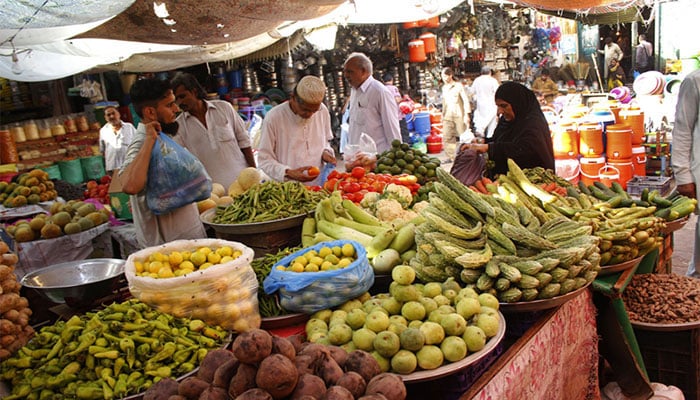Inflation soars to nearly two-year high in Pakistan: PBS
On a month-on-month basis, inflation remained “flattish”, slightly rising by 0.4% owing to an increase in food inflation
ISLAMABAD: The inflation rate continued its upward trajectory for the fifth consecutive month and reached another peak of 13% in January, making it the highest in nearly two years, data from the Pakistan Bureau of Statistics (PBS) showed Tuesday.
Pakistan had reported 14.6% inflation rate in January 2020.
The Consumer Price Index (CPI) jumped to 12.96% in January over the same month a year ago, the PBS reported — a day after Prime Minister Imran Khan deferred a summary to increase the price of petroleum products.
On a month-on-month basis, inflation remained “flattish”, slightly rising by 0.4% owing to an increase in food inflation.
The fresh inflation reading may also impact the interest rates by the State Bank of Pakistan (SBP) which is now following the headline inflation number to determine the policy rate instead of core inflation.
Analysts had already anticipated inflation to be in double digits and the current CPI inflation was in line with their expected targets.
They had predicted inflation to remain high year-on-year because of base inflation being low last year, however, they had mentioned that the inflation rate depended on three factors; electricity prices, rupee-dollar parity and international commodity prices.
Speaking to Geo.tv, an analyst from AHL Sana Tawfiq said that the inflation rate is in line with the market expectation.
Tawfiq said: “The year-on-year increase was fueled by non-food items — housing and transport. Moreover, the base inflation last year was lower.”
Elaborating further, the analyst said that the transport index recorded a significant increase because of rising oil prices in the international market and its spillover impact on local petroleum product prices.
“A receding month-on-month inflation rate is a favourable situation and came on the back of an improvement in food inflation, which recorded a decline for the second consecutive month," she said.
The national data-collecting agency has reported the latest inflation figures after the Monetary Policy Committee meeting last week. The committee kept the interest rate unchanged at 9.75%.
The Wholesale Price Index (WPI), which captures prices in the wholesale market, also rose sharply by 24% in January compared to 6.4% in the same month a year ago.
The PBS reported that the overall inflation rate recorded an increase in both the urban and rural areas. The inflation rate in urban areas edged to 13% in January and rural areas surged to 12.9% over the same month of the last year. In January last year, the inflation rate in urban areas was 5% meanwhile, in rural areas it stood at 6.6%.
The food inflation rate in villages and cities surged to 13.3% and 11.8% on a yearly basis. In January 2021, food inflation for villages and cities clocked in at 7.2% and 7.3% respectively.
The non-food inflation rate clocked in at 12.8% in urban areas and 13.9% in rural areas compared to 3.7% and 6.1% in the same month of last year.
Core inflation — calculated by excluding food and energy items — rose by 8.2% in urban areas and by 9% in rural areas during the month under review, reported the national data collecting agency
The food group saw a price increase of 12.82% in January from the same month a year ago. Within the food group, prices of non-perishable food items surged by 13.77% on an annualised basis meanwhile the prices of the perishable goods were effectively reduced by 6.43% year-on-year.
The inflation rate for the housing, water, electricity, gas, and fuel group — having one-fourth weight in the basket — rose by 15.53% (year-on-year) in the last month.
Average prices for the clothing and footwear group increased by 11.18% in January. Prices related to transportation surged by 23.05% (year-on-year).
On a month-on-month basis, the price of pulse masoor rose by 6.13%, followed by an increase of 4.79% surge in gram whole, 4.11% increase in fruits, nearly 3% in wheat, according to the PBS. The prices of meat and rice recorded an increase of 1.78% and 1.28% in the last month.
The average inflation rate for the first seven months of the current fiscal (July - January) year came in at 10.26%, according to the PBS.
Tawfiq predicted that in the next monetary policy, scheduled to be held on March 8, the central bank is expected to maintain the status quo. She also maintained that the interest rates should be kept unchanged till the close of the ongoing fiscal year 2021-22.
Meanwhile, Tawfiq predicted that due to the measures taken by the government to reduce food inflation, month-on-month inflation will record a decrease next month going forward.
“Overall inflation will decline as the base effects have now subsided,” she said, adding that the breather will come on the back of a decline in food inflation.
The analyst, however, highlighted some factors that can affect the inflation rate which included electricity charges and the Ramzan factor.
Meanwhile, the central banks had said inflation will likely remain high in the near term due to base effects and energy prices.
-
Bitcoin crashes below $63K as regulatory pressure and market fears grow
-
Bitwise Crypto Industry innovators ETF: What investors should do in 2026?
-
Nintendo shares slide again as momentum fears grow
-
Gold, silver prices fallen sharply; What’s driving the drop?
-
Gold’s record climb: Experts question if its safety is ‘overstated’
-
Dubai unveils plans to construct street built with real gold
-
Netflix slams Paramount’s bid: 'Doesn't pass sniff test’ as Warner battle escalates
-
Ubisoft: Shares plunge amid restructuring plan and wave of games cancellations












